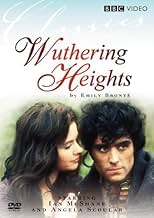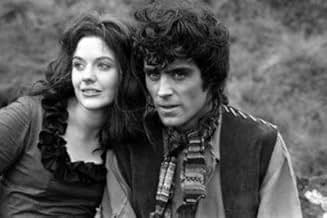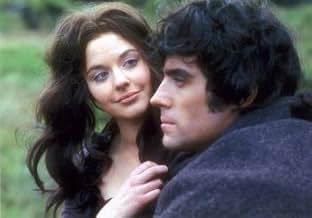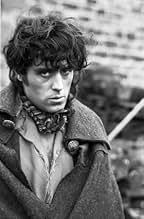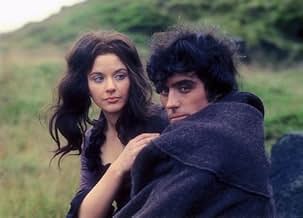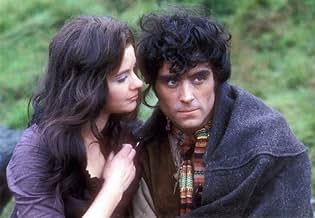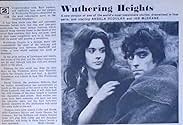Emily Bronte's classic story of destructive passion and immortal love.Emily Bronte's classic story of destructive passion and immortal love.Emily Bronte's classic story of destructive passion and immortal love.
Featured reviews
As one so enamored with Period Piece films, I deeply regret to say that this rendering of the classic Wuthering Heights was almost unwatchable. This is as uninspired a screenplay that was ever ill-conceived in what must have been a lapse of the Screenwriter's sanity There is not a single character that you can truly have empathy for. You want to at least like the patriarch, Mr. Earnshaw, but he too is so gruff, and uncivilized that his genuine affection for the rejected Heathcliff seems almost out of place....Gratuitously violent, pitifully acted, and unskillfully cast and directed, I don't dislike anyone enough to ask them to watch this production!
As many of you might know, Kate Bush wrote her song, Wuthering Heights, shortly after she and her family watched this version at home way back when.
And, intrigued, I hunted down the DVD-among all of the available versions-to see why she enjoyed it so much.
On a rainy, dreary Saturday, my wife and I hunkered down and watched all four parts (182 minutes worth). Here are my admittedly unprofessional criticisms:
The setting in the moors, while hauntingly beautiful, wasn't captured well. Everything was blurry and trembly. Yes, I understand these were 1960's production values, but this just seemed cheap and rushed. As did the residence settings and costumes.
The acting was slipshod. While the two main characters were fairly well-acted, most of the other acting was hit or miss...mostly a miss.
I won't comment on Emily Bronte's characters, though none were really likable. Another time, another place. I get that.
We sat through the entire thing but both commented later that it was pretty horrible, overall.
I'd recommend skipping this mess and just watching Kate's video.
And, intrigued, I hunted down the DVD-among all of the available versions-to see why she enjoyed it so much.
On a rainy, dreary Saturday, my wife and I hunkered down and watched all four parts (182 minutes worth). Here are my admittedly unprofessional criticisms:
The setting in the moors, while hauntingly beautiful, wasn't captured well. Everything was blurry and trembly. Yes, I understand these were 1960's production values, but this just seemed cheap and rushed. As did the residence settings and costumes.
The acting was slipshod. While the two main characters were fairly well-acted, most of the other acting was hit or miss...mostly a miss.
I won't comment on Emily Bronte's characters, though none were really likable. Another time, another place. I get that.
We sat through the entire thing but both commented later that it was pretty horrible, overall.
I'd recommend skipping this mess and just watching Kate's video.
I remember this as a wonderfully rugged version of the story, very earthy and passionate. It captured the wildness of the moors and the Yorkshire weather in a way that the Olivier version never managed.
McShane was born to play Heathcliff and I am sure set many other teenage hearts pounding as well as mine. Cathy was alternately lyrically beautiful and utterly terrifying.
This hallmark BBC production has a second claim to fame. The terrifying spectre of Cathy at the window inspired Kate Bush to write that song.
I wish someone would bring it out on video. It may not be as good as I recall it, and indeed often older TV productions seem stilted by today's standards- but nonetheless, I am certain it would be worth a second look.
McShane was born to play Heathcliff and I am sure set many other teenage hearts pounding as well as mine. Cathy was alternately lyrically beautiful and utterly terrifying.
This hallmark BBC production has a second claim to fame. The terrifying spectre of Cathy at the window inspired Kate Bush to write that song.
I wish someone would bring it out on video. It may not be as good as I recall it, and indeed often older TV productions seem stilted by today's standards- but nonetheless, I am certain it would be worth a second look.
Emily Bronte's Wuthering Heights is a literary masterpiece and a personal favourite. When it comes to adapting Wuthering Heights, it is a very difficult book to adapt like a lot of Charles Dickens and George Eliot, all of the adaptations of the it are watchable(most very good) but there are areas in almost all of them where they fall short. This 1967 Wuthering Heights is not an exception. It is for me one of the weaker adaptations of the book(the 2011 film being the weakest but it's far from bad), some scenes are choppily edited, the adaptation can feel rather stagy in spots sometimes due to the direction(at times a theatrical and for the stage feel) and occasionally the dialogue delivery, and there could have been far more of Heathcliff's motivations and how and why he came to be how he was, something that is made very clear in the book but not so apparent here. There are a lot of good things and the series does more than serviceably on its own terms. The costumes, scenery and exteriors(wasn't so crazy about some of the hair-styles, especially for Heathcliff who looked too wild) are so evocative that you really feel the cold and how cheerless everything is, and in a way that is done better than most of the adaptations. They are very dark and atmospheric, the black and white actually adds to the creepiness, and look very true to period. Also remarkably true to how Bronte describes the moors, fields, trees, food and climate, going far as to using the actual locations themselves, if there was a time machine and we went back here it would most likely be like this. The sounds of the wailing winds on the moors add to the authenticity and have a very haunting quality.
The dialogue has the feeling of Bronte's prose and delivered with passion, though interestingly sometimes in a somewhat Shakespearean-like way. The story does have omissions from the book but it is rich in atmosphere, is at least cohesive and there is a sense of passion and torment(even with Heathcliff not being developed as well as the Timothy Dalton version did) that make up for the spots of staginess. The ending is very poignant, and the image of Cathy's spectre is still terrifying by today's standards. The adaptation does a noble job with letting us empathise with the characters, very hard to do regarding adapting Wuthering Heights and it doesn't always translate as well. True the relationships between the characters are far better fleshed out in the book but there is definitely chemistry and there is at least the basic gist as to how the characters behave to each other. The acting is good, with the supporting characters(especially Hareton, Hindley and Ellen) acted in a way that is recognisable as to their novelistic counterparts. While Angela Scoular is an enchanting, feisty and pitches Cathy's spitefulness and such believably, and Ian McShane is a Heathcliff that is loathsome yet tormented played with gusto and deep feeling(even if some of his delivery is reminiscent of acting on stage, not that it is completely distracting though, just an observation). To conclude, one of the weaker versions of the book but still more than decent. 6.5/10 Bethany Cox
The dialogue has the feeling of Bronte's prose and delivered with passion, though interestingly sometimes in a somewhat Shakespearean-like way. The story does have omissions from the book but it is rich in atmosphere, is at least cohesive and there is a sense of passion and torment(even with Heathcliff not being developed as well as the Timothy Dalton version did) that make up for the spots of staginess. The ending is very poignant, and the image of Cathy's spectre is still terrifying by today's standards. The adaptation does a noble job with letting us empathise with the characters, very hard to do regarding adapting Wuthering Heights and it doesn't always translate as well. True the relationships between the characters are far better fleshed out in the book but there is definitely chemistry and there is at least the basic gist as to how the characters behave to each other. The acting is good, with the supporting characters(especially Hareton, Hindley and Ellen) acted in a way that is recognisable as to their novelistic counterparts. While Angela Scoular is an enchanting, feisty and pitches Cathy's spitefulness and such believably, and Ian McShane is a Heathcliff that is loathsome yet tormented played with gusto and deep feeling(even if some of his delivery is reminiscent of acting on stage, not that it is completely distracting though, just an observation). To conclude, one of the weaker versions of the book but still more than decent. 6.5/10 Bethany Cox
There have been many takes on Wuthering Heights, but the 1967 adaptation brings a distinct flavor-less polished, more intimate, and brimming with restrained intensity. Rather than rely on sweeping theatrics, this version leans into a quieter melancholy, letting the emotional erosion of its characters echo through the moors like distant thunder.
Shot with a stark, almost stage-like simplicity, the film feels stripped down but not underwhelming. That rawness becomes its strength. With limited embellishment, the haunting core of Emily Brontë's story comes into sharper focus-one of obsession, longing, and the slow decay of hearts that cannot move on.
The performances are tightly wound, simmering instead of shouting. It's less about the violence of love and more about its stillness-the ache of it, the silence that follows where words should be. The actors deliver not with melodrama, but with presence, allowing subtle gestures and weighted glances to speak volumes.
The film's atmosphere, while modest in scope, manages to capture the emotional landscape of the novel. You can almost feel the damp chill in the air, the emptiness of windswept hills, and the hollowness left behind when love turns inward and begins to rot.
Wuthering Heights (1967) may not be the loudest or most lavish adaptation, but it lingers. It whispers, not roars-and in doing so, becomes a ghost of itself. A haunting, tragic echo.
Shot with a stark, almost stage-like simplicity, the film feels stripped down but not underwhelming. That rawness becomes its strength. With limited embellishment, the haunting core of Emily Brontë's story comes into sharper focus-one of obsession, longing, and the slow decay of hearts that cannot move on.
The performances are tightly wound, simmering instead of shouting. It's less about the violence of love and more about its stillness-the ache of it, the silence that follows where words should be. The actors deliver not with melodrama, but with presence, allowing subtle gestures and weighted glances to speak volumes.
The film's atmosphere, while modest in scope, manages to capture the emotional landscape of the novel. You can almost feel the damp chill in the air, the emptiness of windswept hills, and the hollowness left behind when love turns inward and begins to rot.
Wuthering Heights (1967) may not be the loudest or most lavish adaptation, but it lingers. It whispers, not roars-and in doing so, becomes a ghost of itself. A haunting, tragic echo.
Did you know
- TriviaIan McShane sprained his wrist early in the filming, but struggled on to complete the mini-series.
- ConnectionsFeatured in Reader, I Married Him: Heroes (2006)
Details
- Release date
- Country of origin
- Official site
- Language
- Also known as
- Rüzgarlı Bayır
- Production company
- See more company credits at IMDbPro
- Runtime
- 50m
- Color
- Color(original broadcast)
Contribute to this page
Suggest an edit or add missing content

